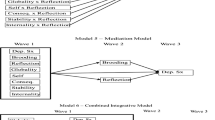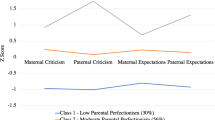Abstract
This pilot study compares the explanatory styles of adolescents, the explanatory styles of their parents, and the parents' causal explanations about their adolescents. Twenty-one adolescents with academic problems and their mothers (n =19) and fathers (n =15) completed the Attributional Style Questionnaire (Peterson et al., 1982). The parents also completed a parallel questionnaire, My Adolescent's Life (MAL). Both mothers' and fathers' explanations of events in their own lives and of events in their adolescents' lives were significantly associated. Fathers' explanations of events in their adolescents' lives were positively correlated with the adolescents' explanations of their own events. In this study, neither mothers' explanations of their own events nor of their adolescents' events nor fathers' explanations of their own events correlated with the adolescents' explanations of their own events. Significant findings with a small sample suggest that this line of inquiry and the MAL are promising for future research.
Similar content being viewed by others
References
Aydin, G. (1988). The remediation of children's helpless explanatory style and related unpopularity.Cognitive Therapy and Research, 12, 155–165.
Bird, J. E., & Berman, L. S. (1985). Differing perceptions of mothers, fathers, and children concerning children's academic performance.Journal of Psychology, 119, 113–124.
Bry, B. H., & Greene, D. M. (1990). Empirical bases for integrating school-and family-based interventions against early adolescent substance abuse. In R. J. McMahon & R. Dev. Peters (Eds.),Behavioral disorders of adolescence: Research, interventions, and policy in clinical and school settings (pp. 81–97). New York: Plenum Press.
Bry, B. H., & Krinsley, K. E. (1990). Adolescent substance abuse: Case study. In E. L. Feindler & G. R. Kalfus (Eds.),Casebook in adolescent behavior therapy (pp. 275–302). New York: Springer.
Dix, T., Ruble, D. N., Grusec, J. E., & Nixon, S. (1986). Social cognition in parents: Inferential and affective reactions to children of three age levels.Child Development, 57, 879–894.
Fincham, F. D., & Cain, K. M. (1986). Learned helplessness in humans: A developmental analysis.Developmental Review, 6, 310–333.
Larrance, D. T., & Twentyman, C. T. (1983). Maternal attributions and child abuse.Journal of Abnormal Psychology, 92, 449–457.
Nolen-Hoeksema, S., Girgus, J. S., & Seligman, M. E. P. (1986). Learned helplessness in children: A longitudinal study of depression, achievement, and explanatory style.Journal of Personality and social Psychology, 51, 435–553.
Parsons, J. E., Adler, T. F., & Kaczala, C. M. (1982). Socialization of achievement attitudes and beliefs: Parental influences.Child Development, 53, 310–321.
Peterson, C. (1988). Explanatory style as a risk factor for illness.Cognitive Therapy and Research, 12, 119–132.
Peterson, C., & Barrett, L. C. (1987). Explanatory style and academic performance among university freshman.Journal of Personality and Social Psychology, 53, 603–607.
Peterson, C., Bettes, B. A., & Seligman, M. E. (1985). Depressive symptoms and unprompted causal attributions: Content analysis.Behavior Research and Therapy, 23, 379–382.
Peterson, C., & Seligman, M. E. P. (1984). Causal explanations as a risk factor for depression: Theory and evidence.Psychological Review, 91, 347–374.
Peterson, C., Semmel, A., von Baeyer, B., Abramson, L. Y., Metalsky, G. I., & Seligman, M. E. P. (1982). The attributional style questionnaire.Cognitive Therapy and Research, 6, 287–300.
Seligman, M. E. P., Peterson, C., Kaslow, N. J., Tanenbaum, R. L., Alloy, L. B., & Abramson, L. Y. (1984). Explanatory style and depressive symptoms among children.Journal of Abnormal Psychology, 93, 235–238.
Author information
Authors and Affiliations
Additional information
This study was based on a master's thesis by the first author at Rutgers University under the direction of the second author. Portions of this article were presented at the annual meeting of the Eastern Psychological Association, Philadelphia, April 1990. This research was partially supported by NIDA grant DA05112 to Dr. Brenna H. Bry. The authors gratefully acknowledge the data collection assistance of Karen E. Krinsley, Shaun Whittaker, and Luis Guerreira.
Rights and permissions
About this article
Cite this article
Turk, E., Bry, B.H. Adolescents' and parents' explanatory styles and parents' causal explanations about their adolescents. Cogn Ther Res 16, 349–357 (1992). https://doi.org/10.1007/BF01183286
Issue Date:
DOI: https://doi.org/10.1007/BF01183286




